日语专业四级-2006年日语专业四级真题
(完整word版)06年专四真题及答案,推荐文档
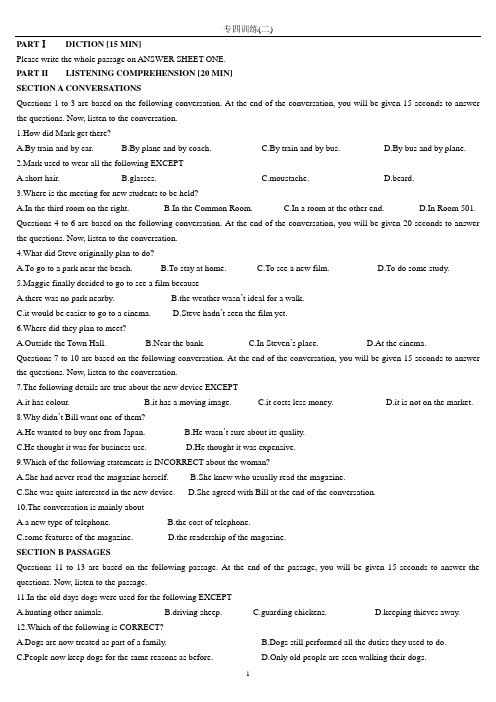
PARTⅠDICTION [15 MIN]Please write the whole passage on ANSWER SHEET ONE.PART II LISTENING COMPREHENSION [20 MIN]SECTION A CONVERSATIONSQuestions 1 to 3 are based on the following conversation. At the end of the conversation, you will be given 15 seconds to answer the questions. Now, listen to the conversation.1.How did Mark get there?A.By train and by car.B.By plane and by coach.C.By train and by bus.D.By bus and by plane.2.Mark used to wear all the following EXCEPTA.short hair.B.glasses.C.moustache.D.beard.3.Where is the meeting for new students to be held?A.In the third room on the right.B.In the Common Room.C.In a room at the other end.D.In Room 501. Questions 4 to 6 are based on the following conversation. At the end of the conversation, you will be given 20 seconds to answer the questions. Now, listen to the conversation.4.What did Steve originally plan to do?A.To go to a park near the beach.B.To stay at home.C.To see a new film.D.To do some study.5.Maggie finally decided to go to see a film becauseA.there was no park nearby.B.the weather wasn’t ideal for a walk.C.it would be easier to go to a cinema.D.Steve hadn’t seen the film yet.6.Where did they plan to meet?A.Outside the Town Hall.B.Near the bank.C.In Steven’s place.D.At the cinema.Questions 7 to 10 are based on the following conversation. At the end of the conversation, you will be given 15 seconds to answer the questions. Now, listen to the conversation.7.The following details are true about the new device EXCEPTA.it has colour.B.it has a moving image.C.it costs less money.D.it is not on the market.8.Why didn’t Bill want one of them?A.He wanted to buy one from Japan.B.He wasn’t sure about its quality.C.He thought it was for business use.D.He thought it was expensive.9.Which of the following statements is INCORRECT about the woman?A.She had never read the magazine herself.B.She knew who usually read the magazine.C.She was quite interested in the new device.D.She agreed with Bill at the end of the conversation.10.The conversation is mainly aboutA.a new type of telephone.B.the cost of telephone.C.some features of the magazine.D.the readership of the magazine.SECTION B PASSAGESQuestions 11 to 13 are based on the following passage. At the end of the passage, you will be given 15 seconds to answer the questions. Now, listen to the passage.11.In the old days dogs were used for the following EXCEPTA.hunting other animals.B.driving sheep.C.guarding chickens.D.keeping thieves away.12.Which of the following is CORRECT?A.Dogs are now treated as part of a family.B.Dogs still performed all the duties they used to do.C.People now keep dogs for the same reasons as before.D.Only old people are seen walking their dogs.13.The passage is mainly aboutA.what dogs can do.B.how to keep dogs.C.dogs and their masters.D.reasons for keeping dogs. Questions 14 to 17 are based on the following passage. At the end of the passage, you will be given 20 seconds to answer the questions. Now, listen to the passage.14.According to the passage, the working conditions in the new placeA.are the same as the speaker is used to.B.are expected to be rather poor.C.are just as adequate.D.are not yet clear.15.What is the speaker going to do in the new place?A.Travelling.B.Studying.C.Settling down.D.Teaching.16.The speaker expectsA.fewer choices of food.B.many ways to do washing.C.modern lighting facilities.D.new types of drinking water.17.From the passage we learn that the speakerA.is unprepared for the new post.B.is unclear about the conditions there.C.is ready for all the difficulties there.D.is eager to know more about the post.Questions 18 to 20 are based on the following passage. At the end of the passage, you will be given 15 seconds to answer the questions. Now, listen to the passage.18.According to the passage, when are children first expected to study hard?A.Before 6 years of age.B.Between 6 and 10.C.After 10 years of age.D.After 12 years of age.19. Parents who abuse their children tend to have the following problems EXCEPTA.religious problems.B.emotional problems.C.financial problems.D.marriage problems.20.Which of the following statements is CORRECT?A.Boys and girls are equally energetic.B.Parents have higher expectations for boys.C.Some parents lack skills to deal with their kids.D.Some parents are ill-educated and ill-tempered. SECTION C NEWS BROADCASTQuestions 21 to 23 are based on the following news. At the end of the news item, you will be given 15 seconds to answer the questions. Now, listen to the news.21.What has happened to the Cubans?A.They set foot in Floria.B.They were drowned.C.They were flown to the U.S.D.They were sent back to Cuba.22.How did the Cubans try to enter the U.S.?A.In a small boat.B.In an old truck.C.By swimming.D.By driving.Questions 23 are based on the following news. At the end of the news item, you will be given 10 seconds to answer the questions. Now, listen to the news.23.How many cities will have air quality monitoring systems installed by the end of this year?A.42 cities.B.220 cities.C. 150 cities.D. 262 cities.Questions 24 and25 are based on the following news. At the end of the news item, you will be given 10 seconds to answer the questions. Now, listen to the news.24. Altogether how many people were reported missing?A. 68.B.90.C. 150.D. 40.25.Which of the following details is INCORRECT?A.The two ferries sank on different days.B.The accidents were caused by storms.C.The two ferries sank on the same river.D.More people were rescued from the first ferry.Questions 26 are based on the following news. At the end of the news item, you will be given 10 seconds to answer the questions.Now, listen to the news.26.What is the news item mainly about?A.Indonesian government policies.B.Australia’s support to the UN assistance mission.C.Opening of an Australian consulate in East Timor.D.Talks between Australia and Indonesia.Questions 27 to 28 are based on the following news. At the end of the news item, you will be given 15 seconds to answer the questions. Now, listen to the news.27. The news item is mainly about a joint venture betweenA.a US company and a UK company.B.a Swiss company and a UK company.C.two Taiwanese companies.D.a mainland company and a US company.28.Who will provide the distribution networks in the joint venture?A.Unilever.B.Nestle.C.PepsiCo.D.Coca Cola.Questions 29 to 30 are based on the following news. At the end of the news item, you will be given 15 seconds to answer the questions. Now, listen to the news.29.Who staged the protect on Saturday?A.The soldiers.B.The peace camp.C.The militants.D. The hardliners.30. Which of the following details about the news is INCOPPECT?A.13 soilders were killed last week.B.100,000 people participated in the protest.C. The protesters demanded a pullout from Gaza.D.The Prime Minister rejected the pullout plan.PART ⅢCLOZE [15 MIN]There are many superstitions in Britain, but one of the most ( 31 )_held is that it is unlucky to walk under a ladder--- even if it means (32)_the pavement into a busy street! (33)_you must pass under a ladder you can (34)_bad luck by crossing your fingers and (35)_them crossed until you have seen a dog. (36)_, you may lick your finger and (37)_a cross on the toe of your shoe, and not look again at the shoe until the (38)_has dried.Another common (39)_is that it is unlucky to open an umbrella in the house---it will either bring (40)_to the person who opened it or to the whole (41)_. Anyone opening an umbrella in fine weather is (42)_, as it inevitably brings rain! The number 13 is said to be unlucky for some, and when the 13th day of the month (43)_on a Friday, anyone wishing to avoid a bad event had better stay (44)_.The worst misfortune that can happen to a person is caused by breaking a mirror, (45)_it brings seven years of bad luck! The superstition is supposed to (46)_in ancient times, when mirrors were considered to be tools of the gods.Black cats are generally considered lucky in Britain, even though they are (47)_witchcraft. It is (48)_lucky if a black cat crosses your path-although in America the exact opposite belief prevails. Finally, a commonly held superstition is that of touching wood (49)_luck. This measure is most often taken if you think you have said something that is tempting fate, such as “my car has never (50)_, touch wood?”31. A broadly B widely C quickly D speedily32. A running from B jumping off C stepping off D keeping from33. A If B As C Though D Unless34. A erase B remove C avoid D ease35. A keep B keeping C kept D to keep36. A Consequently B However C Comparatively D Alternatively37. A make B print C perform D produce38. A label B symbol C mark D cut39. A argument B superstition C opinion D idea40. A loss B difficulty C tragedy D misfortune41. A house B household C home D circle42. A unwise B unintelligent C unpopular D unfortunate43. A falls B arrives C drops D happens44. A away B outdoors C indoors D far45. A when B as C if D though46. A have originated B be originating C be originated D originate47. A concerned about B related with C associated with D connected in48. A especially B specially C frequently D rarely49. A as B for C in D of50. A broken up B broken off C broken away D broken downPART IV GRAMMAR&VOCABULARY [15MIN]51. __ dull he may be, he is certainly a very successful top executive.A AlthoughB whateverC AsD However52. If only I __ play the guitar as well as you!A wouldB couldC shouldD might53. The party, __ I was the guest of honour, was extremely enjoyable.A by whichB for whichC to whichD at which54. It’s high time we __ cutting down the rainforests.A stoppedB had to stopC shall stopD stop55. The student said there were a few points in the essay he __ impossible to comprehend.A has foundB was findingC had foundD would find56. Loudspeakers were fixed in the hall so that everyone __ an opportunity to hear the speech.A ought to haveB must haveC may haveD should have57. I am surprised __ this city is a dull place to live in.A that you should thinkB by what you are thinkingC that you would thinkD with what you were thinking58. Susan is very hardworking, but her pay is not __ for her work.A enough goodB good enoughC as good enoughD good as enough59. It is imperative that the government __ more investment into the shipbuilding industry.A attractsB shall attractC attractD has to attract60. Land belongs to the city; there is __ thing as private ownership of land.A no such aB not suchC not such aD no such61. My daughter has walked eight miles today. We never guessed that she could walk __ far.A /B suchC thatD as62. The statistics __ that living standards in the area have improved drastically in recent times.A provesB is provingC are provingD prove63. There are only ten apples left in the baskets, __ the spoilt ones.A not countingB not to countC don’t countD having not counted64. It was __ we had hopedA more a success thanB a success more thanC as much of a success asD a success as much as65. There used to be a petrol station near the park, __?A didn’t itB doesn’t thereC usedn’t it?D didn’t there66. It is an offence to show __ against people of different races.A distinctionB differenceC separationD discrimination67. A great amount of work has gone into __ the Cathedral to its previous splendour.A refreshingB restoringC renovatingD renewing68. The thieves fled with the local police close on their __.A backsB necksC toesD heels69. The economic recession has meant that job __ is a rare thing.A securityB safetyC protectionD secureness70. Many people nowadays save money to __ for their old age.A caterB supplyC provideD equip71. The tone of the article __ the writer’s mood at the time.A reproducedB reflectedC imaginedD imitated72. This is not the right __ to ask for my help; I am far too busy even to listen!A momentB situationC opportunityD circumstance73. The job of a student accommodation officer __ a great many visits to landladies.A concernsB offersC asksD involves74. Our family doctor’s clinic __ at the junction of two busy roads.A restsB standsC staysD seats75. She was so fat that she could only just __ through the door.A assembleB appearC squeezeD gather76. After the heavy rain, a builder was called to repair the roof, which was __.A leakingB tricklingC drippingD floating77. The reception was attended by __ members of the local community.A excellentB conspicuousC prominentD noticeable78. Share prices on the Stock Exchange plunged sharply in the morning but __ slightly in the afternoon.A regainedB recoveredC restoredD revived79. His __ brain has worked away on the idea of a universal cure.A richB quickC productiveD fertile80. The couple has donated a not __ amount of money to the foundation.A inconsiderableB inconsiderateC inaccurateD incomparablePART ⅤREADING COMPREHENSION [25MIN]TEXT AIn the case of mobile phones, change is everything. Recent research indicates that the mobile phone is changing not only our culture, but our very bodies as well.First, let’s talk about culture. The difference between the mobile phone and its parent, the fixed-line phone, is that a mobile number corresponds to a person, while a landline goes to a place. If you call my mobile, you get me. If you call my fixed-line phone, you get whoever answers it.This has several implications. The most common one, however, and perhaps the thing that has changed our culture forever, is the “meeting” influence. People no longer need to make firm plans about when and where to meet. Twenty years ago, a Friday night would need to be arranged in advance. You needed enough time to allow everyone to get from their place of work to the first meeting place. Now, however, a night out can be arranged on the run. It is no longer “see you there at 8”, but “text me aroun d 8 and we’ll see where we all are”.Texting changes people as well. In their paper, “insights into the Social and Psychological Effects of SMS Text Messaging”,two British researchers distinguished between two types of mobile phone users: the “talkers” and the “texters”-those who prefer voice to text message and those who prefer text to voice.They found that the mobile phone’s individuality and privacy gave texters the ability to express a whole new outer personality. Texters were likely to report that their family would be surprised if they were to read their texts. This suggests that texting allowed texters to present a self-image that differed from the one familiar to those who knew them well.Another scientist wrote of the changes that mobiles have brought to body language. There are two kinds that people use while speaking on the phone. There is the “speakeasy”: the head is held high, in a self-confident way, chatting away. And there is the “spacemaker”: these people focus on themselves and keep out ot her people.Who can blame them? Phone meetings get cancelled or reformed and camera-phones intrude on people’s privacy. So, it is understandable if your mobile makes you nervous. But perhaps you needn’t worry so much. After all, it is good to talk.81 when people plan to meet nowadays, theyA arrange the meeting place beforehandB postpone fixing the place till last minuteC seldom care about when and where to meetD still love to work out detailed meeting plans.82 According to the two British researchers, the social and psychological effect are mostly likely to be seen onA TALKERSB the "speakeasy"C the “spacemaker”D texters83 We can infer from the passage that the texts sent by texters areA quite revealingB well writtenC unacceptable by othersD shocking to others84 according to the passage, who is afraid of being heard while talking on the mobile?A TalkersB T he “speakeasy”C T he “spacemaker”D Texters85 an appropriate title for the passage might beA The SMS effectB Cultural implication of mobile useC Change in the use of the mobileD Body language and the mobile phone!TEXT BOver the last 25 years, British society has changed a great deal-or at least many parts of it have. In some ways, however, very little has changed, particularly where attitudes are concerned. Ideas about social class-whether a person is “working-class” or “middle-class”--are one area in which changes have been extremely slow.In the past, the working-class tended to be paid less than middle-class people, such as teachers and doctors. As a result of this and also of the fact that workers’ jobs were generally much less secure, distinct differences in life-styles and attitudes came into existence. The typical working man would collect his wages on Friday evening and then, it was widely believed, having given his wife her “housekeeping”, would go out and squander the rest on beer and betting.The stereotype of what a middle-class man did with his money was perhaps nearer the truth. He was-and still is – inclined to take a longer-term view. Not only did he regard buying a house as a top priority, but he also considered the education of his children as extremely important. Both of these provided him and his family with security. Only in very few cases did workers have the opportunity (or the education and training) to make such long-term plans.Nowadays, a great deal has changed. In a large number of cases factory workers earn as much, if not more, than their middle-class supervisors. Social security and laws to improve job-security, combined with a general rise in the standard of living since the mid-fifties of the 20th century, have made it less necessary than before to worry about “tomorrow”. Working-class people seem slowly to be losing the feeling of inferiority they had in the past. In fact there has been a growing tendency in the past few years for the middle-classes to feel slightly ashamed of their position.The changes in both life-styles and attitudes are probably most easily seen amongst younger people. They generally tend to share very similar tastes in music and clothes, they spend their money in having a good time, and save for holidays or longer-term plans when necessary. There seems to be much less difference than in previous generations. Nevertheless, we still have a wide gapbetween the well-paid (whatever the type of job they may have) and the low-paid. As long as this gap exists, there will always be a possibility that new conflicts and jealousies will emerge, or rather that the old conflicts will re-appear, but between different groups. 86, which of the following is seen as the cause of class differences in the past?A Life style and occupationB Attitude and incomeC Income and job securityD Job security and hobbies87 the writer seems to suggest that the description of__is closer to truth?A middle –class ways of spending moneyB working-class ways of spending the weekendC working-class drinking habitsD middle-class attitudes88 According to the passage, which of the following is NOT a typical feature of the middle -class?A Desiring for securityB Making long-term plansC Having priorities in lifeD Saving money89 Working-class people's sense of security increased as a result of all the following factors EXCEPTA better social securityB more job opportunitiesC higher living standardD better legal protection.90.Which of the following statements is INCORRECT?A Changes are slowly taking place in all sectors of the British society.B The gap between working -class and middle- class young people is narrowing.C Differences in income will remain but those in occupation will disappear.D Middle-class people may sometimes feel inferior to working-class people.TEXT CFor several days I saw little of Mr. Rochester. In the morning he seemed much occupied with business, and in the afternoon gentlemen from the neighourhood called and sometimes stayed to dine with him. When his foot was well enough, he rode out a great deal.During this time, all my knowledge of him was limited to occasional meetings about the house, when he would sometimes pass me coldly, and sometimes bow and smile. His changes of manner did not offend me, because I saw that I had nothing to do with the cause of them.One evening, several days later, I was invited to talk to Mr. Rochester after dinner. He was sitting in his armchair, and looked not quite so severe, and much less gloomy. There was a smile on his lips, and his eyes were bright, probably with wine. As I was looking at him, he suddenl y turned, and asked me, “do you think I’m handsome, Miss Eyre?”The answer somehow slipped from my tongue before I realized it: ‘No, sir.”“A h, you really are unusual! You are a quiet, serious little person, but you can be almost rude.”“Sir, I’m sorry. I should have said that beauty doesn’t matter, or something like that,”“No, you shouldn’t! I see, you criticize my appearance, and then you stab me in the back! You have honesty and feeling. There are not many girls like you. But perhaps I go too fast. Perhaps you have awful faults to counterbalance your few good points.”I thought to myself that he might have too. He seemed to read my mind, and said quickly,“Yes, you’re right. I have plenty of faults. I went the wrong way when I was twenty-one, and have never found the right path again. I might have been very different.I might have been as good as you, and perhaps wiser. I am not a bad man, take my word for it, but I have done wrong. It wasn’t my character, but circumstances which were to blame. Why do I tell you all this? Because you’re the sort of person people tell their problems and secrets to, because you’re sympathetic and give them hope.”It seemed he had quite a lot to talk to me. He didn’t seem to like to finish the talk quickly, as was the case for the first time.“Don’t be afraid of me, Miss Eyre.” He continued. “you don’t relax or laugh very much, perhaps because of the effect Lowood school has had on you. But in time you will be more natural with me, and laugh, and speak freely. You’re like a bird in a cage. When you get out of the cage, you’ll fly very high. Good night.”91. At the beginning Miss Eyre 's impressions of Mr.Rochester were all EXCEPTA busyB sociableC friendlyD changeable92. In "....and all my knowledge of him was li mited to occasional meetings about the house,…”(the second paragraph), the word “about” meansA aroundB onC outsideD concerning.93. Why did Mr.Rochester say" ..and the you stab me in the back!" (the 7th paragraph)?.A Because Jane had intended to kill him with a knife.B Because Jane had intended to be more critical.C Because Jane had regretted having talked to him.D Because Jane had said something else to correct herself.94. From what Mr.Rochest told Miss Eyre, we can conclude that he wanted toA tell her all his troubles.B tell her his life experience.C change her opinion of him.D change his circumstances.95. At the end of the passage, Mr. Rochester soundedA rudeB coldC friendlyD encouraging.TEXT DThe ideal companion machine-the computer- would not only look, feel, and sound friendly but would also be programmed to behave in a pleasant manner. Those qualities that make interaction with other people enjoyable would be imitated as closely as possible, and the machine would appear to be charming, and easygoing.Its informal conversational style would make interaction comfortable, and yet the machine would remain slightly unpredictable and therefore interesting. In its first encounter it might be somewhat hesitant, but as it came to know the user it would progress to a more relaxed and intimate style. The machine would not be a passive participant but would add its own suggestions, information, and opinions; it would sometimes take the initiative in developing or changing the topic and would have a personality of its own.Friendships are not made in a day, and the computer would be more acceptable as a friend if it imitated the gradual changes that occur when one person is getting to know another. At an appropriate time it might also express the kind of affection that stimulates attachment and intimacy. The whole process would be accomplished in a subtle way to avoid giving an impression of over-familiarity that would be likely to produce irritation. After experiencing a wealth of powerful, well-timed friendship indicators, the user would be very likely to accept the computer as far more than a machine and might well come to regard it as a friend.An artificial relationship of this type would provide many of the benefits that people obtain from interpersonal friendships. The machine would participate in interesting conversation that could continue from previous discussions. It would have a familiarity with the user’s life as revealed in earlier contact, and it would be understanding and good-humored. The computer’s own personality would be lively and impressive, and it would develop in response to that of the user. With features such as these, the machine might indeed become a very attractive social partner.96. Which of the following is NOT a feature of the ideal companion machine?A Active in communicationB Attractive in personality.C enjoyable in performance.D unpredictable in behaviour97. The computer would develop friendships with humans in a (n)___ way.A quickB unpredictableC productiveD inconspicuous.98. Which of the following aspects is NOT mentioned when the passage discusses the benefits of artificial relationships?A Being able to pick up an interesting conversation.B Being sensitive to earlier contact.C Being ready to learn about the person's life.D Having a pleasant and adaptable personality.99Throughout the passage, the author is ____ in his attitude towards the computerA favourableB criticalC vagueD hesitant100. Which might be the most appropriate title of the passage?A Artificial relationships .B How to form intimate relationshipsC The affectionate machineD Humans and computers。
日语四级考试
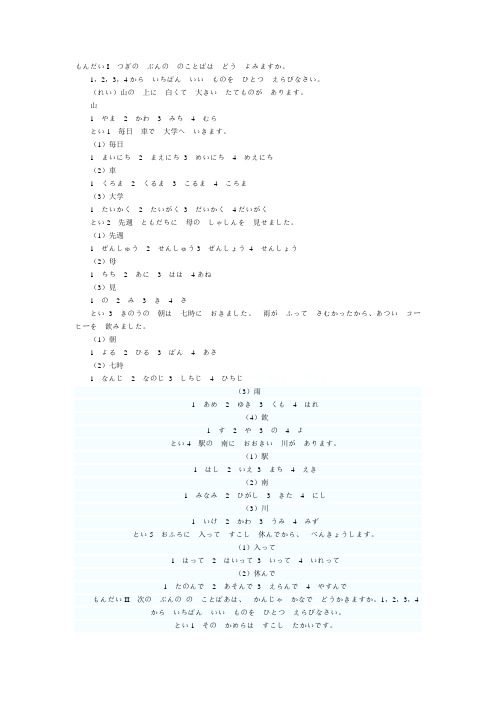
もんだいIつぎのぶんののことばはどうよみますか。
1,2,3,4からいちばんいいものをひとつえらびなさい。
(れい)山の上に白くて大きいたてものがあります。
山1やま2かわ3みち4むらとい1毎日車で大学へいきます。
(1)毎日1まいにち2まえにち3めいにち4めえにち(2)車1くろま2くるま3こるま4ころま(3)大学1たいかく2たいがく3だいかく4だいがくとい2先週ともだちに母のしゃしんを見せました。
(1)先週1ぜんしゅう2せんしゅう3ぜんしょう4せんしょう(2)母1ちち2あに3はは4あね(3)見1の2み3き4さとい3きのうの朝は七時におきました。
雨がふってさむかったから、あついコーヒーを飲みました。
(1)朝1よる2ひる3ばん4あさ(2)七時1なんじ2なのじ3しちじ4ひちじ来源:考试大-小语种考试(3)雨1あめ2ゆき3くも4はれ(4)飲1す2や3の4よとい4駅の南におおきい川があります。
(1)駅1はし2いえ3まち4えき(2)南1みなみ2ひがし3きた4にし(3)川1いけ2かわ3うみ4みずとい5おふろに入ってすこし休んでから、べんきょうします。
(1)入って1はって2はいって3いって4いれって(2)休んで1たのんで2あそんで3えらんで4やすんでもんだいII次のぶんののことばあは、かんじゃかなでどうかきますか。
1,2,3,4からいちばんいいものをひとつえらびなさい。
とい1そのかめらはすこしたかいです。
(1)すこし1示し2小い3少し4不し(2)たかい1長い2高い3多い4安いとい2ドアのみぎにでんきにすいっちがあります。
(1)みぎ1右2石3後4戸(2)でんき1電気2天気3電器4電機(3)すいっち1スイッテ2ネイッテ3スイッチ4ヌイッチとい3いつもここでしんぶんをかいます。
(1)しんぶん1新文2新分3新聞4新本(2)か1員2貿3貸4買とい4らいげつのむいかにともだちがきます。
来源:考试大-小语种考试责编:xyq 评论纠错(1)むいか1 八日2九日3三日4六日(2)き1来2木3気4行もんだいIII次のぶんの()のところになにをいれますか。
日语专业四级考试试题 绝密
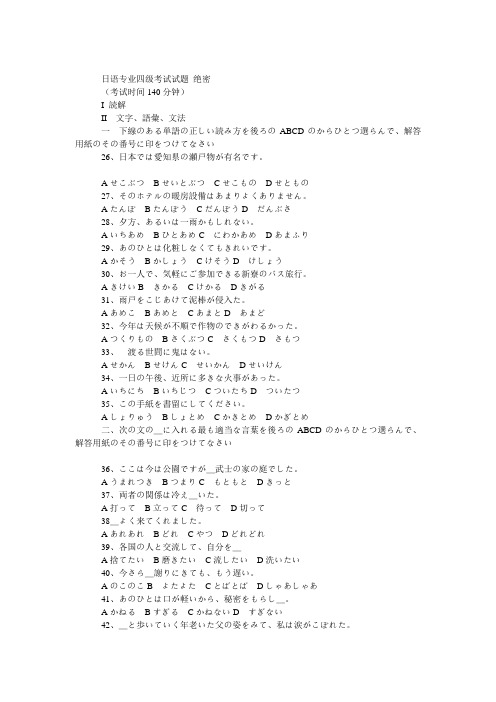
日语专业四级考试试题绝密(考试时间140分钟)I 読解II文字、語彙、文法一下線のある単語の正しい読み方を後ろのABCDのからひとつ選らんで、解答用紙のその番号に印をつけてなさい26、日本では愛知県の瀬戸物が有名です。
AせこぶつBせいとぶつCせこものDせともの27、そのホテルの暖房設備はあまりよくありません。
AたんぽBたんぼうCだんぼうDだんぶさ28、夕方、あるいは一雨かもしれない。
AいちあめBひとあめCにわかあめDあまふり29、あのひとは化粧しなくてもきれいです。
AかそうBかしょうCけそうDけしょう30、お一人で、気軽にご参加できる新寮のバス旅行。
AきけいBきかるCけかるDきがる31、雨戸をこじあけて泥棒が侵入た。
AあめこBあめとCあまとDあまど32、今年は天候が不順で作物のできがわるかった。
AつくりものBさくぶつCさくもつDさもつ33、渡る世間に鬼はない。
AせかんBせけんCせいかんDせいけん34、一日の午後、近所に多きな火事があった。
AいちにちBいちじつCついたちDついたつ35、この手紙を書留にしてください。
AしょりゅうBしょとめCかきとめDかぎとめ二、次の文の_に入れる最も適当な言葉を後ろのABCDのからひとつ選らんで、解答用紙のその番号に印をつけてなさい36、ここは今は公園ですが_武士の家の庭でした。
AうまれつきBつまりCもともとDきっと37、両者の関係は冷え_いた。
A打ってB立ってC待ってD切って38_よく来てくれました。
AあれあれBどれCやつDどれどれ39、各国の人と交流して、自分を_A捨てたいB磨きたいC流したいD洗いたい40、今さら_謝りにきても、もう遅い。
AのこのこBよたよたCとばとばDしゃあしゃあ41、あのひとは口が軽いから、秘密をもらし_。
AかねるBすぎるCかねないDすぎない42、_と歩いていく年老いた父の姿をみて、私は涙がこぼれた。
AすたすたBてくてくCぶらぶらDよたよた43、北海道の海は夏でも冷たい。
大学日语四级练习题1
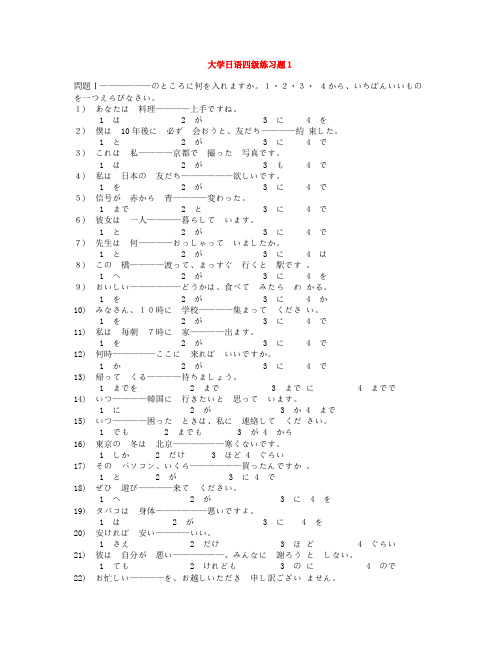
大学日语四级练习题1問題Ⅰ——————のところに何を入れますか。
1・2・3・4から、いちばんいいものを一つえらびなさい。
1) あなたは料理————上手ですね。
1 は2 が3 に4 を2) 僕は10年後に必ず会おうと、友だち————約束した。
1 と2 が3 に4 で3) これは私————京都で撮った写真です。
1 は2 が3 も4 で4) 私は日本の友だち——————欲しいです。
1 を2 が3 に4 で5) 信号が赤から青————変わった。
1 まで2 と3 に4 で6) 彼女は一人————暮らしています。
1 と2 が3 に4 で7) 先生は何————おっしゃっていましたか。
1 と2 が3 に4 は8) この橋————渡って、まっすぐ行くと駅です。
1 へ2 が3 に4 を9) おいしい——————どうかは、食べてみたらわかる。
1 を2 が3 に4 か10) みなさん、10時に学校————集まってください。
1 を2 が3 に4 で11) 私は毎朝7時に家————出ます。
1 を2 が3 に4 で12) 何時—————ここに来ればいいですか。
1 か2 が3 に4 で13) 帰ってくる————待ちましょう。
1 までを2 まで3 までに4 までで14) いつ————韓国に行きたいと思っています。
1 に2 が3 か4 まで15) いつ————困ったときは、私に連絡してください。
1 でも2 までも3 が4 から16) 東京の冬は北京——————寒くないです。
1 しか2 だけ3 ほど4 ぐらい17) そのパソコン、いくら——————買ったんですか。
1 と2 が3 に4 で18) ぜひ遊び————来てください。
1 へ2 が3 に4 を19) タバコは身体——————悪いですよ。
1 は2 が3 に4 を20) 安ければ安い————いい。
1 さえ2 だけ3 ほど4 ぐらい21) 彼は自分が悪い——————、みんなに謝ろうとしない。
2006年日语能力考试四级真题+答案

(28).はじめまして。どうぞ___。 1.ごめんぐださい 2.ごちそうさま 3.こんばんは 4.よろしく
(29).たまごは ___ いりますか。 1.なんこ 2.なんさつ 3.なんだい 4.なんまい
問5・らいねんは ながい やすみが ほしいです。 (24).らいねん 1.未年 2.未年 3.来年 4.来年 (25).ながい 1.辰い 2.弄い 3.兵い 4.長い
問題Ⅲ ______の ところに なにを いれますか。1234から いちばん い い ものを ひとつ えらびなさい。
(26).わたしは よる シャワーを ___。 1.あびます 2.とります 3.なきます 4.ぬぎます
問3・父は 目も 耳も おおきい。 (5).父 1.すち 2.ちぢ 3.しち 4.つち (6).目 1.て 2.あし 3.め 4.はな (7).耳 1.くち 2.あたま 3.みみ 4.からだ
問4・水を 買って いきます。 (8).水 1.くつ 2.みず 3.きって 4.くすり (9).買って 1.かって 2.つくって 3.とって 4.あらって
問1・えいがが すきですが、時間が なくて 見られません。 (1).時間 1.しかん 2.じがん 3.しがん 4.じかん (2).見られません 1.きられません 2.みいられません 3.みられません 4. きいられません
問2・これは 一つ 千円です。 (3).一つ 1.ひとつ 2.ふだつ 3.ふたつ 4.ひどつ (4).千円 1.せいえん 2.せいねん 3.せんねん 4.せんえん
4.この問題用紙は、全部で9ページあります。 This question booklet has 9 pages.
2006年日语四级听力真题 附答案和听力原文
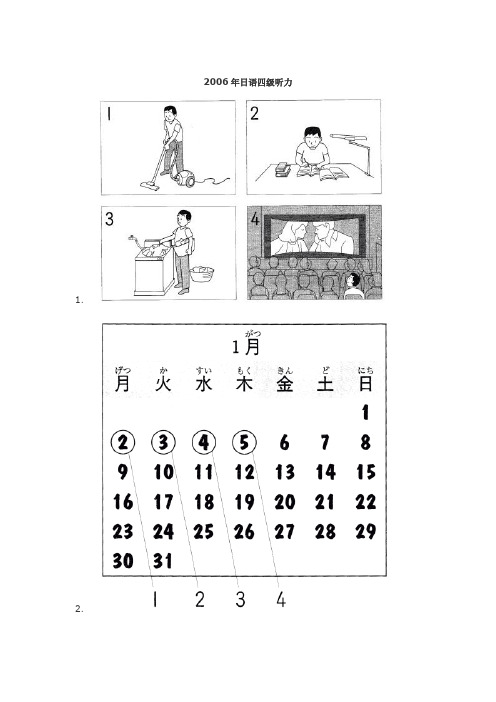
2006年日语四级听力1.2.3.4.5.6.7.8.9.2. 无图题問題I1番女の人と男の人が話しています。
男の人は来週の日曜日の午後何をしますか。
女:ヤンさんは休みの日はいつも何をしていますか。
男:休みの日は朝から掃除と洗濯をします。
そして、午後は買い物をしたり、映画を見たりします。
女:では、来週の日曜日、いっしょに映画を見に行きませんか。
男:ああ、すみません。
来週の月曜日はテストですから、日曜日の午後はうちで勉強します。
女:そうですか。
◆男の人は来週の日曜日の午後何をしますか。
【正解:2】2番女の人と男の人が話しています。
女の人の会社は何日から仕事が始まりますか。
女:田中さんの会社は1月何日から仕事ですか。
男:4日まで休みで、5日から仕事です。
女:いいですね。
わたしの会社は火曜日からもう仕事です。
休みは2日までです。
男:そうですか。
◆女の人の会社は何日から仕事が始まりますか。
【正解:2】3番男の人が話しています。
写真と名前はどうしますか。
男:写真は紙の左に張ってください。
それから、名前は写真の下に書いてください。
◆写真と名前はどうしますか。
【正解:1】4番男の人と女の人が話しています。
男の人に電話するときは何番を押しますか。
男:田中さんの部屋の番号は何番ですか。
女:811です。
男:ああ、わたしの部屋番号は818です。
困ったときは電話してください。
電話するときは始めに9を押して、それから部屋番号を押してください。
女:わかりました。
どうもありがとうございます。
◆男の人に電話するときは何番を押しますか。
【正解:4】5番女の人が話しています。
女の人はどれを見て話していますか。
女:ええ、日本人の大人にお風呂にどのぐらい入るか聞きました。
これを見てください。
一番多かったのは毎日お風呂に入ると答えた人でした。
その次に多かったのが二日に一回入ると答えた人で、毎日お風呂に入る人の半分ぐらいでした。
◆女の人はどれを見て話していますか。
大学日语四级考试真题

大学日语四级考试样题试卷一一、将自己的学校名、姓名、准考证号写在答题卡和试卷二上。
考试结束后,将答题卡、试卷一、试卷二放在桌子上,待监考人员收卷后方可离开考场。
答题卡、试卷一、试卷二均不得带走。
二、仔细读懂题目的说明。
三、在120分钟内答完全部试题,不得拖延时间。
四、客观多项选择试题的答案一定要划在答题卡上,主观试题写在试卷二上。
凡写在试卷一上的答案一律作废。
五、客观多项选择试题只能选一个答案,多选作废。
选定答案后,用HB-2B铅笔按规定在相应字母的中部划一条横线。
正确的方法如下:[A][B][C][D]六、如果要改动答案,必须先用橡皮擦去原来选定的答案。
七、主观试题用钢笔或圆珠笔书写。
Ⅰ聴解セクション(听解部分)(20分間)これから聞くテストを行います。
一、写真問題(图片题)写真か絵を見て質問に答えてください。
はじめに写真か絵について質問します。
その後で文を四つ言います。
その四つの中から正しい答えを一つ選んでください。
文は1回しか言いません。
まず例題をしてみましょう。
例題[A] [B] [C] [D](可先在试卷上选,然后划到答题卡上,下同。
)答えはAです。
このような問題は1から5まであります。
それでは、問題を始めます。
1.2.3.4.5.[A] [B] [C] [D] [A] [B] [C] [D] [A] [B] [C] [D] [A] [B] [C] [D][A] [B] [C] [D]二、応答問題(应答题)始めに一人が短い文を一つ言う。
その後でもう一人がそれに答える。
正しい答えを[A][B][C][D]から、一つ選んでください。
文は一回しか言いない。
まず例題をしてみよう。
例題[A] [B] [C] [D]答えはAです。
このような問題は6から10まであります。
それでは、問題を始めます。
6.[A] [B] [C] [D]7.[A] [B] [C] [D]8.[A] [B] [C] [D]9.[A] [B] [C] [D]10.[A] [B] [C] [D]三、会話問題(对话题)二人の会話を聞いて、質問に答えてください。
日语专四2006真题答案及解析

日语专四2006真题答案及解析在备考日语专四考试过程中,掌握往年真题并进行答案解析是非常重要的。
通过分析真题,可以更好地了解考试的题型和出题思路,有针对性地进行备考。
下面将对2006年日语专四真题进行答案解析,希望对考生的备考有所帮助。
听力部分1. 答案:B解析:题目中提到了和平洋地区,而B选项中的“手提箱大小”是按照和平洋地区的规定来的,因此可以推断B选项是正确答案。
2. 答案:A解析:对话中两人将在5点50分见面,而A选项中的“渐行渐近”符合这一要求,因此A选项是正确答案。
3. 答案:C解析:根据对话内容,可以知道吉田要求足球队员将球踢到柱子上时,球绝对不能超过柱子的高度。
而C选项中的“球踢中了柱子”与此意思相同,因此C选项是正确答案。
4.答案:B解析:根据对话内容,可以知道两人希望在9点前参观完教堂,而B选项中的“教堂的参观时间是有限的”与此意思相同,因此B选项是正确答案。
5. 答案:C解析:根据对话内容,可以知道两人打算乘坐在11点20分发车的火车。
而C选项中的“11点10分乘火车”符合题意,因此C选项是正确答案。
阅读理解部分第一篇6. 答案:C解析:文章提到赫尔利教授认为大脑是构成人格的重要因素,并举了学习世界语的例子来支持他的观点。
因此C选项中的“大脑是决定人格的一个重要因素”与此意思相符,因此C选项是正确答案。
7. 答案:D解析:根据文章内容,可以知道人格的形成因素中既包括遗传因素,也包括后天因素。
而D选项中的“既有遗传的也有后天形成的”与此意思相符,因此D选项是正确答案。
8. 答案:B解析:文章提到尽管有些人可能遗传了聪明的头脑,但如果没有适当的教育和培养,也无法发挥出优势。
因此B选项中的“一个人尽管聪明,如果没有受过良好的教育,也无法发挥自己的优势”与此意思相符,因此B选项是正确答案。
第二篇9. 答案:A解析:根据文章内容,可以知道斯景图是摄影界的先驱者,他将摄影艺术与科学相结合,采用了一些新技术拍摄照片。
- 1、下载文档前请自行甄别文档内容的完整性,平台不提供额外的编辑、内容补充、找答案等附加服务。
- 2、"仅部分预览"的文档,不可在线预览部分如存在完整性等问题,可反馈申请退款(可完整预览的文档不适用该条件!)。
- 3、如文档侵犯您的权益,请联系客服反馈,我们会尽快为您处理(人工客服工作时间:9:00-18:30)。
日语专业四级-2006年日语专业四级真题1、時間A.しかんB.じがんC.しがんD.じかん2、見られませんA.きられませんB.みいられませんC.みられませんD.きいられません3、一つA.ひとつB.ふだつC.ふたつD.ひどつ4、千円A.せいえんB.せいねんC.せんねんD.せんえん5、父A.すちB.ちぢC.しちD.つち6、目A.てB.あしC.めD.はな7、耳A.くちB.あたまC.みみD.からだ8、水A.くつB.みずC.きってD.くすり9、買ってA.かってB.つくってC.とってD.あらって10、前A.まいB.めえC.めいD.まえ11、立ってA.たってB.すわってC.のってD.とまって12、半分A.はんぷんB.はんぶんC.ほんぶんD.ほんぷん13、聞いてA.きいてB.おいてC.ひらいてD.はたらいて14、古いA.ぬるいB.わるいC.ふるいD.まるい15、電話A.でんきB.でんわC.てんわD.てんき16、がっこうA.学校B.字校C.字枚D.学枚17、やすんだA.体すんだB.体んだC.休すんだD.休んだ18、なんA.同B.何C.向D.伺19、ぱーてぃーA.ベーティーB.バーティーC.パーディーD.パーティー20、あめA.冊B.両C.雨D.再21、いきませんA.行きませんB.仕きませんC.代きませんD.征きません22、かいしゃA.今杜B.会社C.今社D.会杜23、なかA.史B.中C.央D.内24、らいねんA.未年B.未年C.来年D.来年25、ながいA.辰いB.弄いC.兵いD.長い26、わたしはよるシャワーを___。
A.あびますB.とりますC.なきますD.ぬぎます27、ここでたばこを___ぐださい。
A.かけないでB.きえないでC.すわないでD.つかないで28、はじめまして。
どうぞ___。
A.ごめんぐださいB.ごちそうさまC.こんばんはD.よろしく29、たまごは___いりますか。
A.なんこB.なんさつC.なんだいD.なんまい30、あたらしいことばを___。
A.もちますB.なりますC.おぼえますD.つとめます31、きょうはかぜが___です。
A.みじがいB.つよいC.ふといD.ほそい32、うみには___ひとがたぐさんいました。
A.あさいB.うすいC.からいD.わかい33、にほんごでながい___をかきました。
A.にもつB.てがみC.いろD.え34、こうさてんの___にびょういんがあります。
A.そばB.たてC.にわD.はこ35、この___はおいしいです。
A.かびんB.とけいC.めがねD.やさい36、問題Ⅳ______のぶんとだいたいおなじいみのぶんはどれですか。
1234からいちばんいいものをひとつえらびなさい。
わたしはじがへたです。
A.わたしはじがまるくありません。
B.わたしはじがおおきくありません。
C.わたしはじがすきではありません。
D.わたしはじがじょうずではありません。
37、きむらさんのおばさんはあのひとです。
A.きむらさんのおかあさんのおかあさんはあのひとです。
B.きむらさんのおかあさんのおとうさんはあのひとです。
C.きむらさんのおかあさんのいもうとさんはあのひとです。
D.きむらさんのおかあさんのおとうとさんはあのひとです。
38、げんかんにだれかいますよ。
A.いえのいりぐちにひとがいます。
B.がっこうのろうかにひとがいます。
C.まどのちかくにひとがいます。
D.ビルのうえにひとがいます。
39、にほんへははじめていきます。
A.にほんへはあまりいきません。
B.にほんへはまだいっていません。
C.にほんへはよくいきます。
D.にほんへ1かいいきました。
40、やまださんはすずきさんにえいごをおしえました。
A.すずきさんはやまださんにえいごをみせました。
B.やまださんはすずきさんにえいごををみせました。
C.すずきさんはやまださんにかえいごをならいました。
D.やまださんはすずきさんにえいごをならいました。
41、毎日しんぶん___読みます。
A.がB.にC.をD.へ42、きのうのパーティー___何をしましたか。
A.をB.でC.へD.が43、りんご___3つ買いました。
A.がB.にC.のD.を44、どの人___山下さんですか。
A.がB.をC.はD.か45、わたしはおじいさん___よくさんぽをします。
A.とB.をC.のD.へ46、ナイフ___パンをきりました。
A.でB.がC.にD.を47、おすしを食べました。
それから、てんぷら___食べました。
A.がB.かC.はD.も48、すみません、お水___ください。
A.がB.をC.にD.や49、としょかんで3時間べんきょうしました。
でも、うち___しませんでした。
A.とはB.がはC.にはD.では50、わたしは友だち___電話をしました。
A.にB.やC.をD.で51、あにはサッカー___すきです。
A.とB.のC.がD.に52、12時___なりました。
ひるごはんの時間です。
A.がB.にC.かD.へ53、車のうしろ___子どもがいます。
A.にB.でC.をD.へ54、母はかぜ___びょういんへ行きました。
A.にB.がC.でD.は55、カトレア___いう店をしっていますか。
A.をB.がC.にD.と56、わたしのへやはあまり___。
A.きれくないですB.きれくありませんC.きれいありませんD.きれいじゃありません57、きのうははを___ねました。
A.みがくないでB.みがかないでC.みがないでD.みがきないで58、ギターを___ください。
A.ひきてB.ひいてC.ひいでD.ひきって59、あしたはゆきが___でしょう。
A.ふりてB.ふってC.ふるD.ふると60、中山「いますぐでかけましょうか。
」上田「いいえ、そうじを___からでかけましょう。
」A.してB.したC.するD.しって61、さいふを___こまりました。
A.なくしますB.なくしたC.なくすD.なくして62、来週国へ___人はいますか。
A.かえってのB.かえるC.かえるのD.かえって63、もう少し___してくださいませんか。
A.しずかにB.しずかだC.しずかD.しずかで64、先週はしゅくだいが多くて___。
A.たいへんしましたB.たいへんですC.たいへんでしたD.たいへんだったでした65、しごとが___なりました。
A.いそがしいにB.いそがしくC.いそがしいD.いそがしくて66、わたしは外国で___たい。
A.はたらけB.はたらいC.はたらくD.はたらき67、あのケーキは___よ。
A.おいしくなかったB.おいしいくなかったC.おいしいじゃなかったD.おいしくないだった68、___ながら食べないでください。
A.あるくB.あるいてC.あるきD.あるかな69、___ときは、先生に聞きます。
A.わからないのB.わからないC.わかったのD.わかって70、このレストランはいつもたくさん人が___ね。
A.ならんでありますB.ならべていますC.ならんでいますD.ならべてあります71、___でえいがを見ますか。
A.どこB.どんなC.どうD.どのか72、わたしは___買いませんでした。
A.どれをB.いくらC.何かD.何も73、きょうはよる9時___かえります。
A.じゅうB.までC.ごろD.ぐらい74、あしたわたしのへやへあそびに___か。
A.きてくださいB.きましたC.きませんD.きましょう75、ぎゅうにゅうはぜんぶ飲みました。
___ありません。
A.とてもB.もっとC.まだD.もう76、ゆうべは___ねましたか。
A.どんなB.どのぐらいC.いくつD.どちら77、A「かいぎのへやは4かいですね。
」B「___。
5かいですよ。
」A.はい、そっですB.とてもいいですC.いいえ、ちがいますD.わかりません78、A「だれがおさらをあらいましたか。
」B「___。
」A.いいえ、あらいませんでしたB.父のおさらですC.父があらいましたD.はい、あらいました79、(電話で)A「もしもし、すずきです。
そちらに中田さんはいますか。
」B「はい、___。
」A.そちらはすずきですB.ちょっとまってくださいC.そちらにいますD.中田さんですたはい80、A「ごはんを食べてから、おふろに入りますか。
」B「いいえ、わたしは___。
」A.ごはんのまえに入りますB.食べたあとで入りますC.いつも一人で食べますD.ごはんをたくさん食べません81、[___]には何を入れますか。
A.本は29日、ざっしは22日ですB.本は22日、ざっしは29日ですC.本もざっしも29日ですD.本もざっしも22日です82、この学生は何さつかりましたか。
A.3さつB.4さつC.5さつD.6さつ83、この学生はとしょかんで何をしましたか。
A.本に名前を書きました。
B.かみに本の名前を書きました。
C.じしょをかりました。
D.本とざっしをかりました。
84、このとしょかんで学生ができることは何ですか。
A.ざっしを2しゅうかんかりることB.本を5さつかりることC.本やざっしを4さつまでかりることD.本とじしょを1しゅうかんかりること85、これは手がみを出すときにつかいます。
ふうとうにこれをはって、それから、ポストに入れます。
これはゆうびんきょくなどで買います。
「これ」は何ですか。
A.はがきB.きっぷC.ペンD.きって86、きのうは友だちのいえへ行って、友だちがつくったりょうりを食べました。
すこしからかったです。
でも、とてもおいしかったです。
わたしも友だちもたくさん食べました。
また食べたいです。
ただしいものはどれですかA.わたしはりょうりをつくりました。
B.友だちはりょうりがじょうずです。
C.りょうりはおいしくありませんでした。
D.友だちはあまり食べませんでした。
87、わたしのうちから学校まで[___]かかります。
うちからA 駅までじてんしゃで10分です。
A駅からB駅まででんしゃで30分ぐらいです。
それから、B駅でバスにのります。
バスにのってだいたい10分か15分で学校につきます。
[___]には何を入れますか。
A.1時間ぐらい。
B.40分か45分。
C.0分ぐらい。
D.10分か15分。
